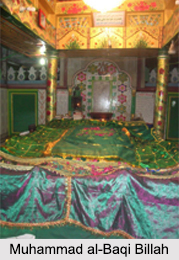 Muhammad al-Baqi Billah was one of the great Sufi Saints of India. He was born in 972 Hijri (1562 AD) in the city of Kabul in the land of Ajam, which was then a colony of the Sultanate of India. His father was a judge. From his early childhood Muhammad al-Baqi Billah exhibited signs of a great ascetic. He was a divine soul filled with love for the Almighty. He came to India in the first instance on personal business. Here he got interested in spirituality and, therefore, gave up his worldly life in the quest of spiritual knowledge. It is said that one day when he was reading a book on Sufism, his heart got illuminated with the divine light. It is believed that the soul of great Naqshbandi Sufi Master Shah Bahauddin Naqshband sowed the seed of divine love in his heart and blessed him with the capacity to do Jikr. This also aroused in him a strong desire to seek the shelter of a Master.
Muhammad al-Baqi Billah was one of the great Sufi Saints of India. He was born in 972 Hijri (1562 AD) in the city of Kabul in the land of Ajam, which was then a colony of the Sultanate of India. His father was a judge. From his early childhood Muhammad al-Baqi Billah exhibited signs of a great ascetic. He was a divine soul filled with love for the Almighty. He came to India in the first instance on personal business. Here he got interested in spirituality and, therefore, gave up his worldly life in the quest of spiritual knowledge. It is said that one day when he was reading a book on Sufism, his heart got illuminated with the divine light. It is believed that the soul of great Naqshbandi Sufi Master Shah Bahauddin Naqshband sowed the seed of divine love in his heart and blessed him with the capacity to do Jikr. This also aroused in him a strong desire to seek the shelter of a Master.
He was so restless in the search of a Master that his holy mother was not able to bear with his desperation and she used to pray for him to the Almighty for fulfilling his desire. Her prayers were answered soon when one day the Holy Master Muhammad Khwaja al-Amkanaki appeared in his dream and invited Baqi Billah to visit him. Muhammad al-Baqi Billah travelled continuously until he reached the city of Samarqand. There he came in the contact with the Master of his time, Muhammad Khwaja al-Amkanaki. He stayed with him for three days. Muhammad Khwaja al-Amkanaki initiated him in the Naqshbandi Order, authorized him to take followers and asked him to go back to India to introduce the Naqshbandi Sufi Order there.
When he was returning to India, India Muhammad al-Baqi Billah stayed in Lahore for about a year. Saints and scholars of Lahore were deeply impressed by him. In India he settled in the city of Delhi. Through him the Naqshbandi Order spread with great swiftness throughout the Indian Subcontinent. People in the subcontinent were attracted to his knowledge, his Heavenly Power and his Prophetic Characteristics. It was held by many that true seekers, by merely looking into his eyes, or by sitting in his company doing Jikr, could enter into a state of self effacement. Through this state they could reach the state of Fana or total annihilation in a single sitting.
It is said that his heart used to remain always filled with divine-love. Because of this, if he focused his attention on some one even once, that person used to get deeply influenced. Many people turned to be `Avdhut` (a fakir totally absorbed in trance) by merely seeing his face. Baqi Billah was also very kind hearted. If he saw some old person walking on foot, he would offer him his own conveyance and would himself walk on foot. However, before they reached the destination he would mount himself on the conveyance again so that no one would know that he had offered his own conveyance to some one else. If any of his disciples did anything wrong or committed any mistake, he took it to be a result of his own shortcoming, for if this shortcoming was not there in him, it would not have been reflected in the disciple.
Baqi Billah died at the age of forty years. A little before his death a Maulvi asked him to explain the meaning of his name `Baqi Billah`. He told the Maulvi that the meaning of his name would be explained to him after his death. A few days later, Baqi Billah fell ill. When the Maulvi came to see him, he repeated his question. Baqi Billah told him that the person who will offer the last prayer at his dead body would give him the answer. On his death while the people were waiting for the Imam to arrive for offering the last prayer, they saw a person, fully covered in a sheet, coming from far off. He completed the ritual of offering the last prayer at the dead body and started proceeding back from where he had come. The Maulvi followed him and asked him to explain the meaning of Baqi Billah. That person removed the sheet and showed his face to the Maulvi. He was Baqi Billah himself. Thus, he explained the meaning of Baqi Billah, as the one who lives eternally in the God.



















